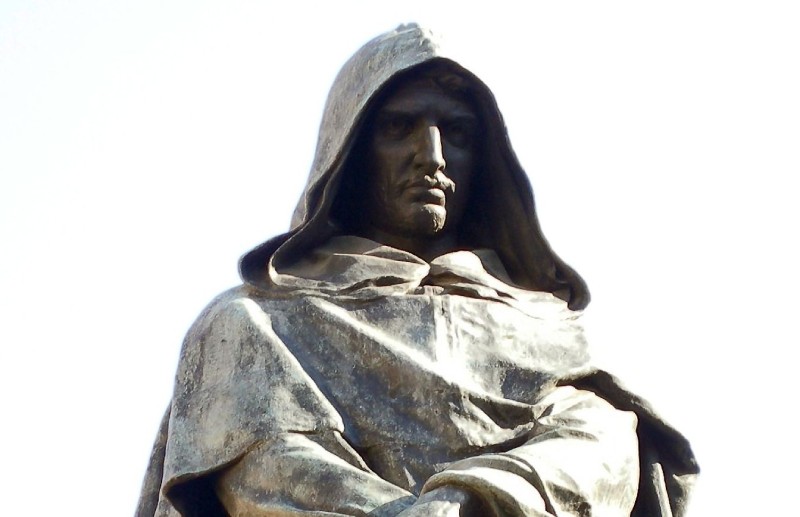The myth of Orpheus and Eurydice is one of the most famous love stories in world literature. The tragic story has been described by both Ovid and Virgil.

According to the original myth – of which many variants have appeared over time, sometimes with happy endings – Orpheus was a king’s son from Thrace. His mother Calliope, the muse of poetry, gave him the gift of singing. When Orpheus sings his songs, accompanying himself on a lyre donated by Apollo, all listeners are entranced. Even animals are touched by his songs. Motionless stones are entranced and the wind is breathless as Orpheus sings his songs.
So life smiles on Orpheus and he is also happy in love. Eurydice, the most beautiful nymph of the Naiads, falls in love with the famous singer. Shortly before the two are to marry, however, misfortune strikes. The shepherd god Aristaeus has his eye on Eurydice and decides to chase her so he can dishonor her. Startled, Eurydice flees. She escapes the shepherd god but is bitten in her heel by a viper on the way. The poison in the wound turns out to be deadly. Eurydice dies. Her soul descends to the realm of the dead. An inconsolable Orpheus is left behind.
To the realm of the dead
A life without Eurydice is unthinkable for the singer. He still sings and plays the lyre, but they are only songs in which he laments the passing of his beloved. Then Orpheus gets a plan. He himself will travel to the realm of the dead to personally beg Hades, the god of the shadow world, to release his beloved so that she can return to the land of the living. Via Taenarum, a peninsula where, according to the ancient Greeks, the entrance to the underworld was located, the grieving singer descends determinedly into the realm of the dead. With his music he manages to soften the three-headed hellhound Cerberus, guardian of the realm of the dead, so that he allows him to walk on. And also the ferryman Charon, responsible for transferring the dead to the shadowy realm, he knows how to get them to cooperate with his song. Once on the other side of the Styx, the infamous river that separates the upper world from the underworld, Orpheus moves on, past countless shadows, in search of Hades. Orpheus hopes that the god, who himself once had an intense love affair, will be receptive to his story. Once before Hades, Orpheus addresses the god. Ovid:
“O deities of this dark world beneath
the earth! this shadowy underworld, to which
all mortals must descend! If it can be
called lawful, and if you will suffer speech
of strict truth (all the winding ways
of Falsity forbidden) I come not
down here because of curiosity
to see the glooms of Tartarus and have
no thought to bind or strangle the three necks
of the Medusan Monster, vile with snakes.
But I have come, because my darling wife
stepped on a viper that sent through her veins
death-poison, cutting off her coming years.“If able, I would bear it, I do not
deny my effort—but the god of Love
has conquered me—a god so kindly known
in all the upper world. We are not sure
he can be known so well in this deep world,
but have good reason to conjecture he
is not unknown here, and if old report
almost forgotten, that you stole your wife
is not a fiction, Love united you
the same as others. By this Place of Fear
this huge void and these vast and silent realms,
renew the life-thread of Eurydice.“All things are due to you, and though on earth
it happens we may tarry a short while,
slowly or swiftly we must go to one
abode; and it will be our final home.
Long and tenaciously you will possess
unquestioned mastery of the human race.
She also shall be yours to rule, when full
of age she shall have lived the days of her
allotted years. So I ask of you
possession of her few days as a boon.
But if the fates deny to me this prayer
for my true wife, my constant mind must hold
me always so that I can not return—
and you may triumph in the death of two!”– Metamorfoses 10:17-39 (Bron)
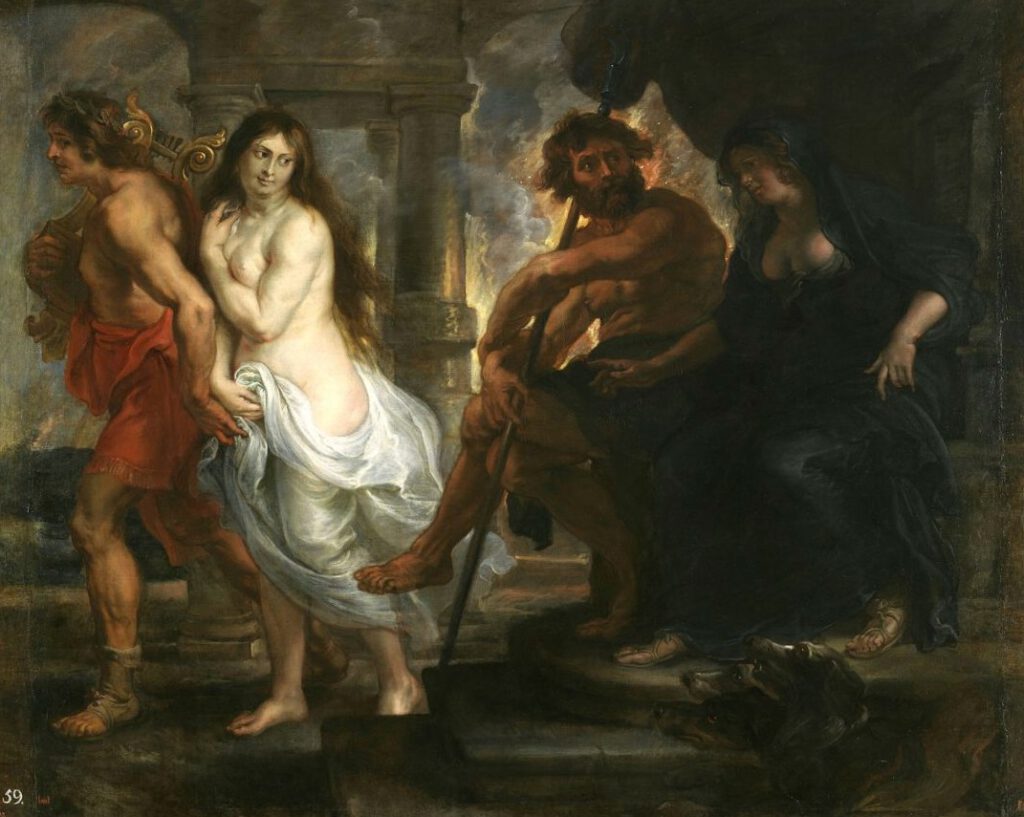
While Orpheus sings his story, accompanying himself on his lyre, a shudder goes through the realm of the dead. The ghosts, affected by the sorrow and love of the lonely singer, begin to cry. The Danaids, sentenced to lifelong hard labor for a heinous deed, put down their work for a while and even the unfortunate Sisyphus briefly stops with his tormenting work. Hades and his wife Persephone were also touched by the suffering of Orpheus and his passionate announcement that he would rather die than return to Thrace without Eurydice. It is also the first time that a living person in the underworld appears to them.
The pair of gods decide to stroke the heart with their hands. They summon Eurydice. Because of the wound in her heel, she with difficulty comes closer and then sees her beloved standing. She wants to fly into his arms, but Hades warns her to control herself. First the god of the realm of the dead wants to address the two lovers. Yes, he gives Eurydice permission to return to the land of the living with her beloved, but there is one important condition. During the journey up, Eurydice has to keep walking behind her husband and neither of them are allowed to look back once on the way. If they do, Eurydice will remain forever in the realm of the dead.
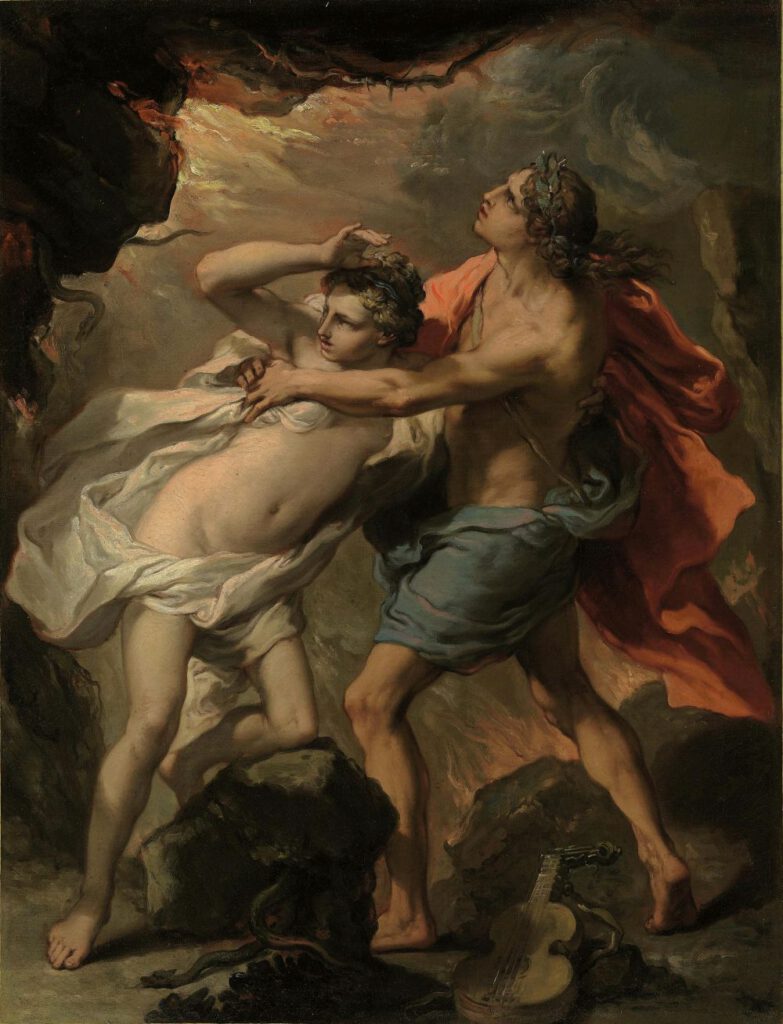
Once en route, walking a dead still, dark path that slowly leads to the living world above them, Orpheus begins to have doubts. He hears nothing. Does Eurydice still follow him? He wants to look back, but Hades’s comment prevents him from turning around. He continues on, but the doubt continues to gnaw. When they have almost reached the upper world, Orpheus can no longer hold out. Ovid:
There remained
but little more to climb till they would touch
earth’s surface, when in fear he might again
lose her, and anxious for another look
at her, he turned his eyes so he could gaze
upon her. Instantly she slipped away.
He stretched out to her his despairing arms,
eager to rescue her, or feel her form,
but could hold nothing save the yielding air.
Dying the second time, she could not say
a word of censure of her husband’s fault;
what had she to complain of — his great love?
Her last word spoken was, “Farewell!” which he
could barely hear, and with no further sound
she fell from him again to Hades.– Metamorfoses 10:55-63 (Source)
Orpheus is left behind, dismayed. Once again he has lost his beloved. He tries to return to Hades so that he can still take his beloved home, but in vain. Unlike during his first trip, the ferryman Charon now refuses to take him to the other side of the Styx.
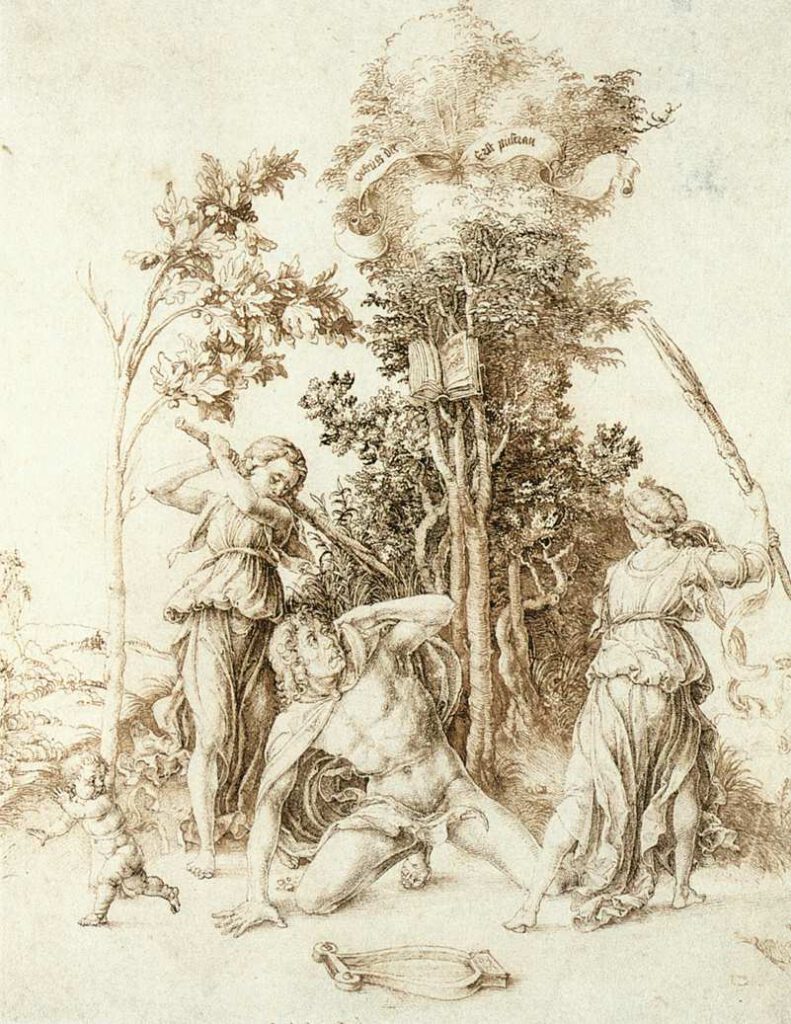
The Death of Orpheus
Orpheus returns bitterly to his homeland. The offended singer is no longer involved with women. Only boys can still charm him. This to the annoyance of the Bacchantes, the wild nymphs who worship the wine god Dionysos. They can’t bear the fact that the once adored singer doesn’t have to know anything about women anymore. When some Bacchantes come across Orpheus one day in the woods playing his lyre and enthralling the plants and animals around him, they decide to take revenge on the unfortunate singer. During a nighttime orgy, they overpower Orpheus and kill him. His body is dismembered. Naiads and Dryads (nymphs) then take care of the remains of the dishonored singer. His limbs are buried. Only the head of Orpheus, along with his lyre, is taken into the river Hebrus.Then suddenly a vibration goes over the water. The lyre begins to play, and from Orpheus’s mouth comes a song. The head is slowly taken to the beach of Lesvos, where it then makes pronouncements as an oracle. The soul of Orpheus, however, travels to the realm of the dead, to join Eurydice after all.
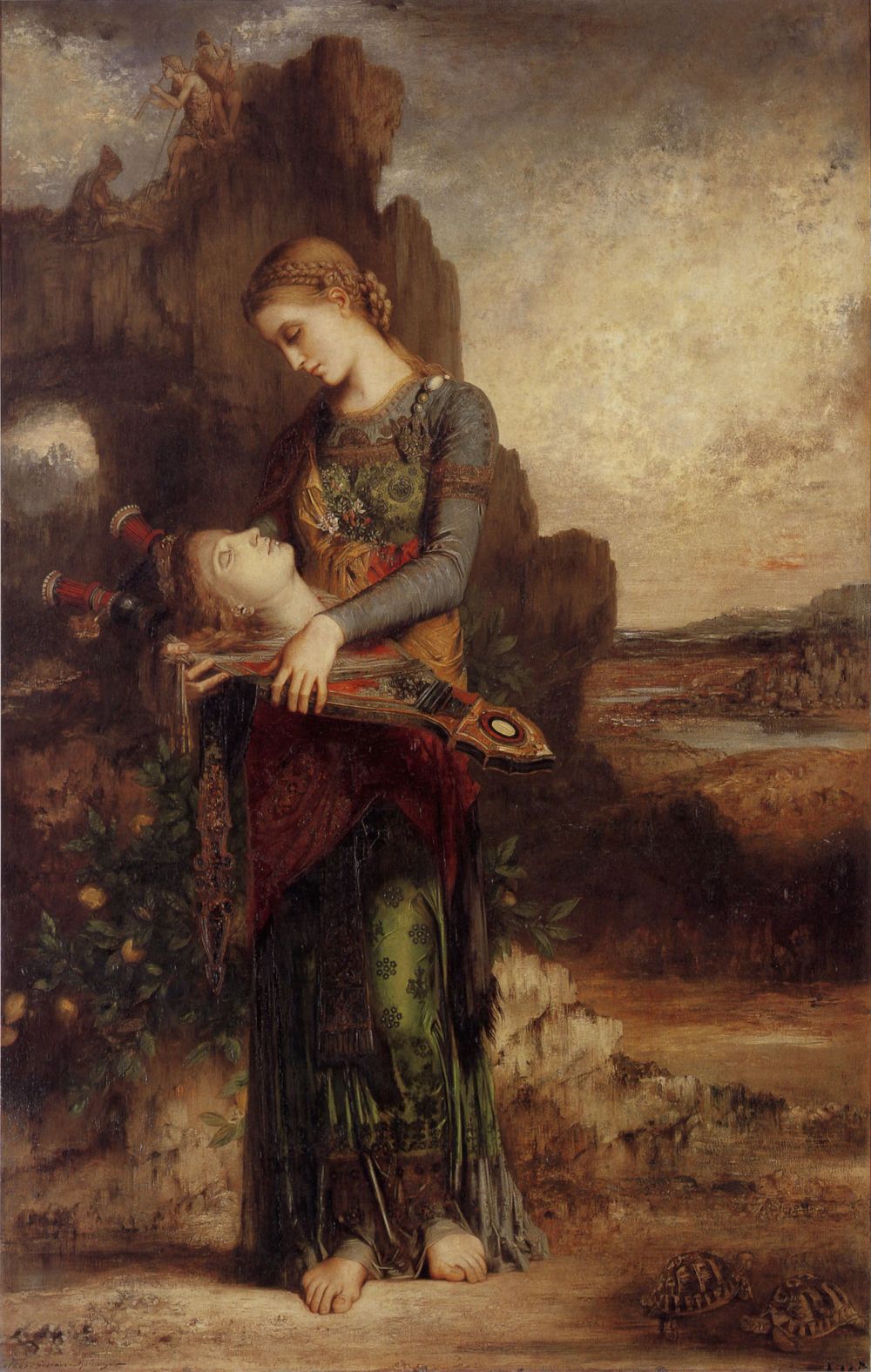
Orphism
According to some readings, a religious movement arose in ancient Greece, based on lessons and songs of Orpheus. Hard evidence for the existence of a real religion is lacking, but there are indications that Greece had a so-called Orphistic movement around the fifth century BC. In this religious movement, which would have been especially popular among people who did not find satisfaction in the official state religion, the wine god Dionysos played a major role.




